Karen M. Swindler Department of Chemical & Biological Engineering
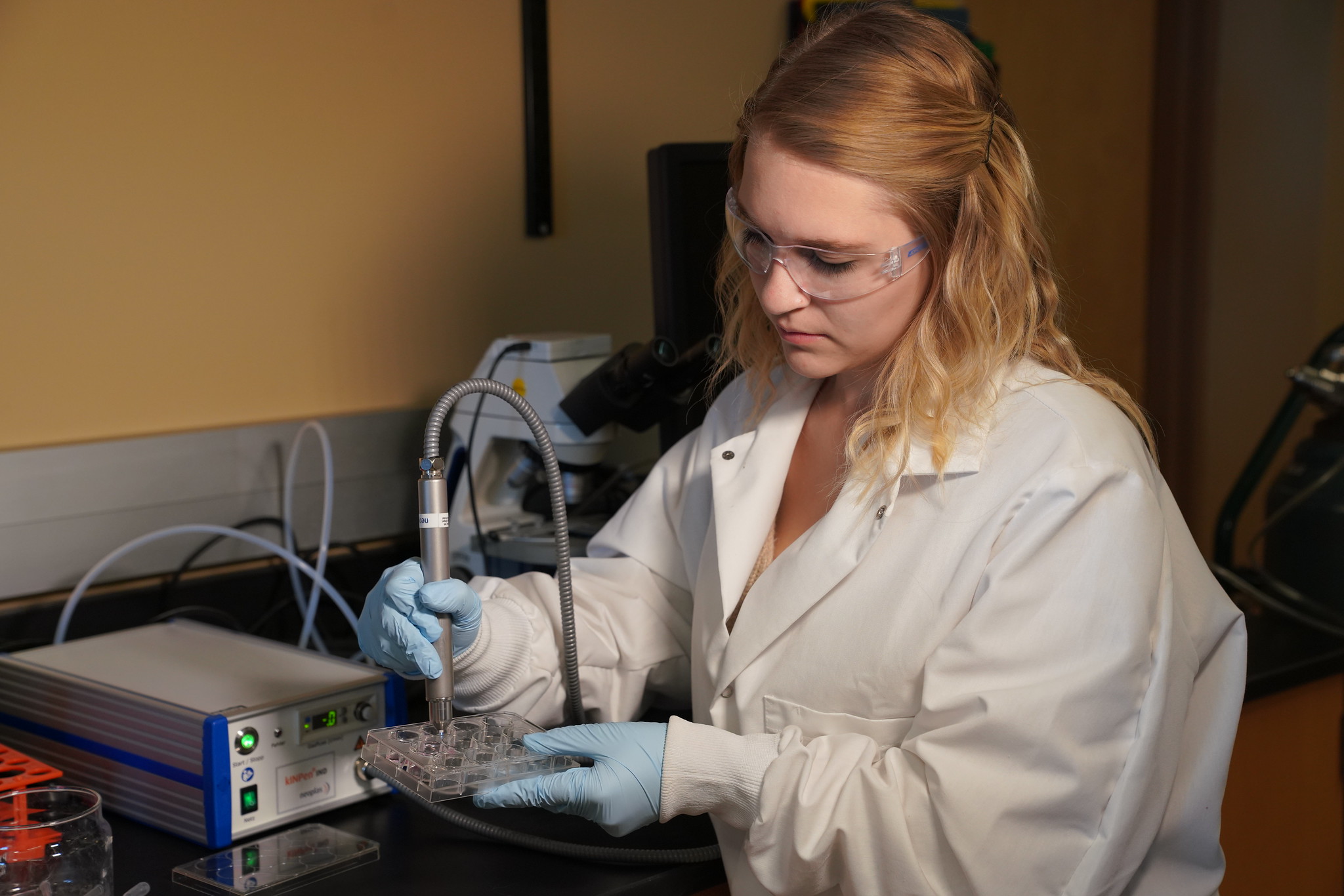
Chemical Engineering (ChE) is an optimal combination of the molecular sciences (chemistry and biology), the physical sciences (physical chemistry and physics), the analytical sciences (math and computer programming) and engineering. The Bachelor of Science in Chemical Engineering is accredited by the Engineering Accreditation Commission of ABET and focuses on the description and design of processes that combine engineering principles of heat and fluid flow with chemical reactions and molecular separations to produce high-value products useful to humankind from multiple raw material sources. Chemical Engineers do this while always insuring that the processes they design, build and manage are safe, environmentally benign and economical.
Examples of such processes include:
|
|
|
|
|
|
|
|
|
|
|
|
|
|
Department Overview
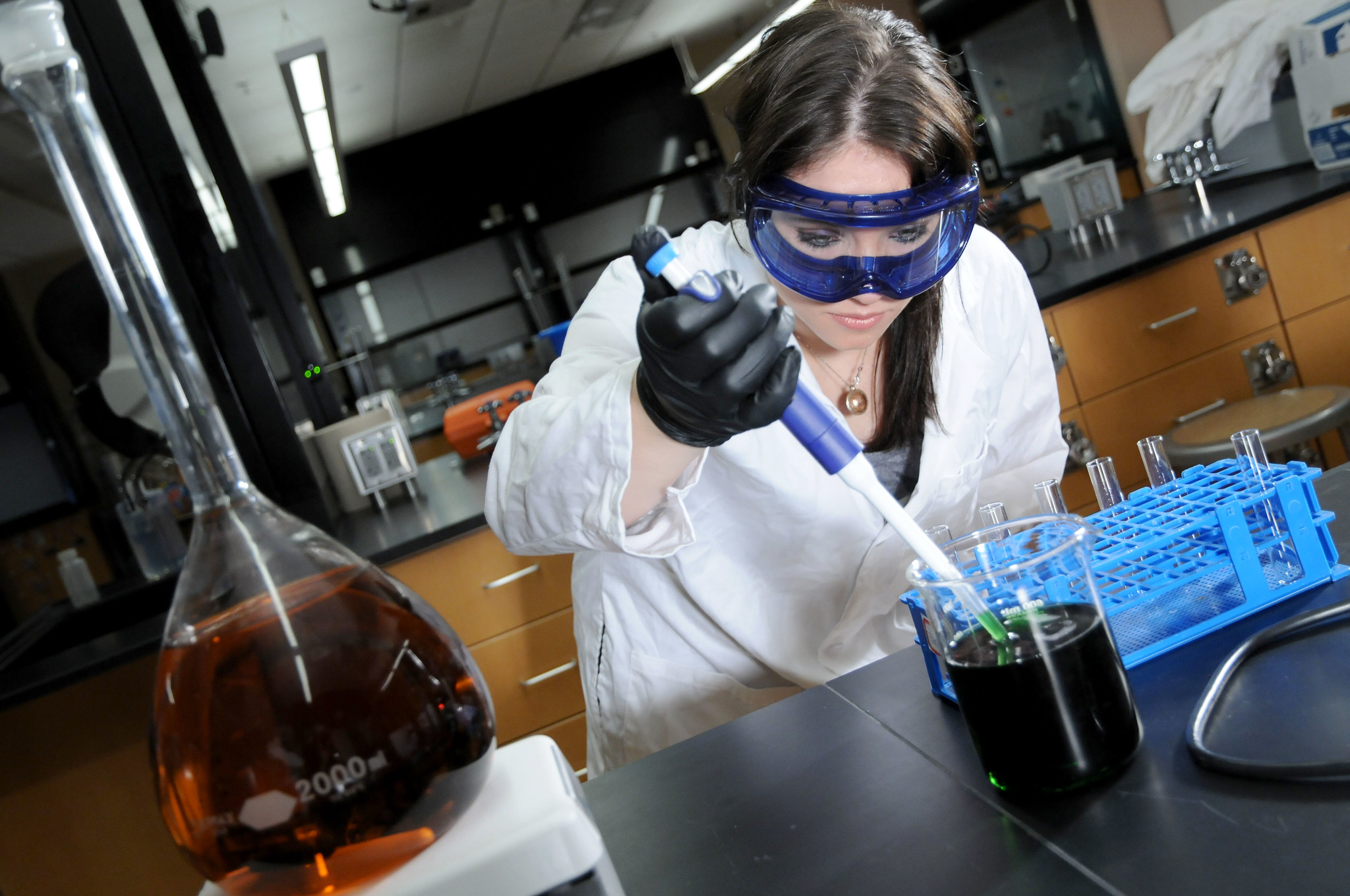
American Institute of Chemical Engineers (AIChE)
Mission
We are the South Dakota School of Mines and Technology Student Chapter of American Institute of Chemical Engineers. Our mission includes:
- Opportunities for networking with professionals and students
- Education outside the classroom
- Facilitate faculty and student interaction
- Increase campus and community awareness of chemical engineering
Meeting Information
Please check AIChE Facebook Page for the most up-to-date information regarding events and meetings.
Contact Information
If you would like to get in touch with the AIChE or attend our meetings, contact our AlChE chapter president at aiche@mines.sdsmt.edu.
For more information about AIChE, click here to visit the website.
Innovation Club for Engineers
Mission
Our mission is to provide entrepreneurial resources and opportunities to students of the School of Mines as well as members of the community via weekly high-value meetings and semesterly conferences.
Dept. of Chemical and Biological Engineering
SD Mines Campus - Chemistry and Chemical Engr Bldg
501 E. St. Joseph Street
Rapid City, SD 57701
The bachelor of science program in chemical engineering is accredited by the Engineering
Accreditation Commission of
ABET, Inc.
415 N. Charles Street
Baltimore, MD 21201
Telephone: 410‐347‐7700
Fax: 443‐552‐3644
E‐mail: accreditation@abet.org
http://www.abet.org
BS Chemical Engineering Program Educational Objectives
Through the baccalaureate degree, students are prepared to become practicing chemical engineers ready to enter the workforce and make immediate contributions. The chemical engineering program produces graduates who can perform at a level that meets or exceeds industry expectations. Within a few years of their graduation, our graduates should have the characteristics described by the following program educational objectives.
- Graduates apply fundamental and practical knowledge of unit operations, thermodynamics, reaction engineering, process control, and design of safe, economical, and sustainable chemical/biological processes.
- Graduates are successfully employed and advancing in governmental and industrial positions requiring chemical engineering expertise.
- Graduates are prepared to succeed in graduate and professional programs.
BS Chemical Engineering Program Student Outcomes
Through the baccalaureate degree, students are prepared to become practicing chemical engineers ready to enter the workforce and make immediate contributions. The chemical engineering program produces graduates who perform at a level that meets or exceeds industry expectations. Based on the program educational objectives, six program student outcomes were established. At the time of their graduation, our graduates have the characteristics described by the following program student outcomes.
- An ability to identify, formulate, and solve complex engineering problems by applying principles of engineering, science, and mathematics
- An ability to apply engineering design to produce solutions that meet specified needs with consideration of public health, safety, and welfare, as well as global, cultural, social, environmental, and economic factors
- An ability to communicate effectively with a range of audiences
- An ability to recognize ethical and professional responsibilities in engineering situations and make informed judgments, which must consider the impact of engineering solutions in global, economic, environmental, and societal contexts
- An ability to function effectively on a team whose members together provide leadership, create a collaborative and inclusive environment, establish goals, plan tasks, and meet objectives
- An ability to develop and conduct appropriate experimentation, analyze and interpret data, and use engineering judgment to draw conclusions
- An ability to acquire and apply new knowledge as needed, using appropriate learning strategies.
Find more information on student achievement, enrollment, retention and placement at South Dakota Mines.
Through cooperative education (co-ops) and internships, School of Mines students have many opportunities to apply their education to "real world" work experiences. Students are employed by industry and government agencies in positions related to Chemical and Biological Engineering. Students may gain 1-3 hours of academic credit for their co-op or internship experience upon department approval. Students registered for co-op courses keep their full-time student status during the semester they are on co-op. All Mines students are encouraged to have relevant work or research experience prior to graduation. Co-ops are often 6-8 months (semester + summer). Internships are usually for the summer or part-time during the school year. However, the terms are used interchangeably by employers.
On average 75% of School of Mines graduates have relevant work
experience upon graduation.
The average co-op/intern salary for 2015-16 was $17.16/hr.
Some employers also provide housing allowances, bonuses,
and relocation expenses that are not reflected above.
We strongly encourage students to seek out these opportunities. Students who spend two or more academic terms working for an industrial partner gain a better understanding of exactly what it's like to work as a chemical engineer in industry. Students often end up with permanent job offers from the companies they co-op with. Even if they decide not to work for the company they co-op with, co-op experience is a definite asset when students begin to interview for permanent jobs after graduation. For questions regarding co-op opportunities within the CBE department or program, please contact the co-op advisor, Dr. Kenneth Benjamin.
More Information
Sample Employer Evaluation Form
Contact
Dr. Kenneth Benjamin
(605) 394-2636
Kenneth.Benjamin@sdsmt.edu

Karen M. Swindler (ChemE ’88) had more than 25 years of experience in the chemical industry and was one of the only women in charge of manufacturing for an S&P Fortune 500 company, LyondellBasell.
She credited South Dakota Mines for giving her a practical education, enabling her success in life. She gave back to the university through volunteering: recruiting students; presenting to university classes and organizations, including as keynote speaker at the regional AIChE conference; serving on the Chemical Engineering Advisory Board; and serving on the Alumni Association Board of Directors, including a term as president from September 2017 until she passed away in July 2018.
A generous gift made by Lee Swindler and his family honors Karen’s memory as well as her contributions to the field of chemical engineering and South Dakota Mines.
Chemical and biological engineering students have access to a wide variety of state-of-the-art instruments and laboratories, including:
Analytical Laboratory
FT-IR spectrometer with microscope
FT-IR spectrometer with Attenuated Total Reflection (ATR)system
Laser-Raman spectrometer
HP 6890 gas chromatograph
Others (UV-Vis spectrometer,AA, ICP, Ion chromatograph)
Bioseparations Laboratory
AKTA Explorer FPLC Purification System
Waters UPLC
Zetameter size/charge analyzer
Streaming potential analyzer
Reverse osmosis filtration unit
Ultrafiltration/microfiltration units
High Performance Computing Cluster(shared with Physics Department)
49 Nodes/568 CPUs Total
2100-2600 MHz Processor Speeds
Software includes Accelrys Materials Studio, VASP, Gaussian, LAMMPS, Towhee, Etomica,
CHEMKIN, and Comsol
Mechanical and Thermal Testing Laboratory
MTS mechanical tester
Setaram microcalorimeter
Cincinnati micron injection molding machine
Microscopy Laboratory
Scanning electron microscope with energy dispersive X-ray and image analyzer (SEM/EDX)
Transmission electron microscope (TEM)
Atomic force microscope (AFM)
Interfacial force microscope (IFM, one of a half dozen in the world)
Process Design and System Analysis Computer Laboratory
IBM RISC / 6000 workstations
AspenPlus model manager (steady state process simulator)
AspenPlus speedup (dynamic simulator)
HYSYS process (steady state and dynamic process simulator)
Personal computer laboratory (Gateway 2000 Multimedia Pentium computers)
HSC software
Process Control Laboratory
Camile 3000 controller and data acquisition system
Reaction and Separation Engineering Laboratory
Combustion synthesis reactorCentrifugal combustion synthesis reactor
SHS reactor
Supercritical extractor
Supercritical equilibrium, and variable volume view cell
Supercritical reactor
The South Dakota Mines Chemical and Biological Engineering speaker series includes leading experts on a wide range of topics.
Presentations
Spring 2020
- Jan. 21, 2020 - Kris Dahl, Mechanical Changes of the Cell Nucleus in Disease and Aging
- Jan. 28, 2020 - Jeffrey Reimer, NMR and the Grand Challenges of Metal-Organic Frameworks
- Feb. 4, 2020 - Roman Shchepin, Parahydrogen-Based Hyperpolarization (HP)
- Feb. 25, 2020 - Diego Gomez-Gauldron, Computer-accelerated discovery of advance porous crystals: Are we there yet?
- Mar. 31, 2020 - Heather J. Kulik, Accelerating the computational discovery of catalyst design rules and exceptions with machine learning
Fall 2019
- Sept. 3, 2019 - Haluk Beyenal, Electrochemically Active Biofilms
- Sept. 10, 2019 - Ram Gupta, Clean Energy for a Growing and Prospering World
- Sept. 17, 2019 - Paul J. Dauenhauer, At the Frontier of Mobile Renewable Energy from
Dynamic Catalyst Surface Resonance
- Sept. 24, 2019 - Seongkyu Yoon, Biomanufacturing Sciences – Challenges and Opportunities
- Oct. 1, 2019 - Govind Chilkoor, Phenotypical Responses of Sulfate Reducing Biofilms Grown on Metal Surfaces Modified with 2D Coatings
- Oct. 8, 2019 - Keith Johnston, Soft Matter Stabilization at Challenging Conditions for Drug Delivery and Energy Applications
- Oct. 11, 2019 - Malliga Perumal, Cyanobacterial Bioprocessing for Agricultural and Industrial Applications
- Oct. 15, 2019 - Baron Peters, Single Atom Catalysts on Amorphous Supports: A Wild Frontier for ab initio Calculation
- Oct. 22, 2019 - Dave Bushong, The Impact of Bioproducts & Biotechnology
- Oct. 29, 2019 - Ilias Belharouak, Battery Storage Systems for Mobility and Electrification
- Nov. 5, 2019 - Robert Pantazes, The Development of Computational Methods for the Design and Identification of Therapeutic Proteins
- Nov. 19, 2019 - Roy Sayan, Flexible Antennas, 3D Printed Radio Frequency Circuits, and Real-Time In-situ Wireless Monitoring
Spring 2019
- Jan. 17, 2019 - Matt Ellis, Economic Model Predictive Control: Tracing a Path from Theory to Industrial Productization
- Jan. 22, 2019 - Maria Carreon, Nitrogen Fixation: Unveiling the plasma-based route
- Jan. 24, 2019 - Zack Fishman, Transition Metal Oxide Nanosheets: Synthesis, Tuning, and Catalysis
- Jan. 29, 2019 - Lynn Secondo, Toxicological Inhalation Effects of Metal-Based Nanoparticle Aerosols as Studied by a Portable In Vitro Exposure Cassette
- Jan. 31, 2019 - Jamie Harris, Catalysis Beyond the Active Site
- Feb. 5, 2019 - Congzhou Wang, Harnessing Surface Force and Surface Plasmon for Nanobioanalytics
- Feb. 12, 2019 - Prasoon Diwakar, From Sample to Signal: Laser Produced Plasma as an Analytical Source
- Feb. 19, 2019 - Etienne Gnimpieba, From the Single Cell Of Origin Prediction (SCOOP) to the Biofilm Data and Information Discovery System (Biofilm-DIDS)
- March 12, 2019 - Jia Wang, Exopolysaccharides from a Thermophilic Bacterium Geobacillus sp. WSUCF1
- March 21, 2019 - Scott Reisenauer, B9Creations – Inception to Global 3D Printing Solutions
- March 26, 2019 - Darren Haar, Business Ventures – Do You Have an Entrepreneurial Passion?
- April 2, 2019 - Charlie Chen, History of Contact Lenses and Contact Lens Materials
- April 9, 2019 - George Bonheyo, Losing Gracefully: Developing Anti-biofouling Strategies for Environments Where Nature Always Wins
- April 16, 2019 - Venkat Ganesan, In Pursuit of Mechanically Strong, Conducting Polymer Electrolytes
Fall 2018
- Aug. 28, 2018 - Clint Chapman, Ph.D. candidate, The Synthesis and Characterization of Novel Energetic Cocrystals
- Sept. 4, 2018 - NK Rathinam, Biofilm Engineering Approaches for Improving the Performance of Bioelectrochemical Systems
- Sept. 11, 2018 - Dr. Jaret Heise, Building on Rich Legacies in Both Mining and Transformational Physics Research
- Sept. 18, 2018 - Konstantinos P. Giapis, Mining Outer Space for Small Molecules
- Sept. 25, 2018 - Stanley Sandler, A New Thermodynamic Prediction Method and its Application to Chemical Weapons
- Oct. 9, 2018 - Kenneth Cox, Special Insights From the Development of Associating Fluid Models and the Limit of Infinite Dilution
- Oct. 16, 2018 - Mohit Bibra, Thermophiles for Biofuel Production
- Oct. 23, 2018 - Matthew Fields, Biogeochemical Constraints on Methanogenesis in a Subsurface, Recalcitrant Carbon Environment
- Oct. 30, 2018 - Shankarachary Ragi, Control, Decision, and Optimization Methods for Unmanned Systems and Swarm Dynamics
- Nov. 27, 2018 - Govind Chilkoor, Nano-meter Coatings Based on 2D Materials for Microbial Corrosion Application
Spring 2018
- Jan. 16, 2018 - Dr. Charles Baukal, Minimizing NOx from Process Burners
- Jan. 23, 2018 - Dr. Gordan J. Freeman, Dr. Michael Sadelain,
- Feb. 6, 2018 - Yichun Ding, Development of Flexible and Wearable Electronics for Human Health Monitoring
- Feb. 20, 2018 - Dr. Markus Busch, High-pressure Polymerization Technology-a Supercritical Fluid Process On World Scale
- Feb. 27, 2018 - Dr. Eric S.G. Shaqfeh, Suspended Particles in Complex Fluids: From Fracking Fluids to Swimming Worms
- March 20, 2018 - Dr. Alan West, Analysis and Characterization of Transport in Electrochemical Energy Storage
- March 27, 208 - Dr. David Sholl, Expanding the chemical palette for reliable adsorption-based separations
- April 3, 2018 - Dr. Matthew Tirrell, Polyelectrolytes in multivalent ionic media: New physics and new materials
- April 10, 2018 - Dr. Jordan Peccia, A Systems-based Approach Toward Improving Fatty Acid Production in Photosynthetic Microorganisms
- April 24, 2018 - Dr. Walter Chapman, A Molecular Model for Upstream Engineering Applications: Phase Behavior, Interfacial Properties and Micro-structure
Fall 2017
- Sept. 12, 2018 - Kevin Mairose, Gas Phase Hydrocarbon Adsorption for Spent Vapor Recovery
- Sept. 19, 2018 - Dr. Magesh T. Rajan, Laser-plasma induced synthesis of high purity nanomaterials in liquids with enhanced physical, chemical, thermal and transport properties; and Cold plasma technologies for surface treatment, microbial and chemical deactivation, and biomedical applications
- Oct. 3, 2018 - Dr. Vikas Berry, Chemically and Structurally Manipulating Graphene for Electronic Applications
- Oct. 17, 2018 - Dr. Keisha Walters, Design, Synthesis and Characterization of Stimuli Responsive Nanocomposites
- Nov. 7, 2018 - Dr. Colin Wolden, Green Manufacturing of Alkali Sulfide Nanostructures for Next Generation Batteries
- Nov. 14, 2018 - Dr. Lance Wheeler, Enabling Next-Generation Photovoltaics with Switchable Perovskites and Quantum Dot Surface Chemistry
- Nov. 28, 2018 - Dr. Ross P. Carlson, In-Silico and In-Vitro Analysis of Resource Allocation in Biofilm Consortia
Spring 2017
- Jan. 17, 2017 - (Webinar) Karen Swider-Lyons, Hydrogen Fuel Cells for Small Unmanned Air Vehicles, US Naval Research Laboratory
- Jan. 24, 2017 - Professor Clayton J. Radke, “Evaporative Tear-Film Instability: The Origin of Dry Eye”, University of California
- Feb. 14, 2017 - Alan G. Marshall, Petroleomics: Chemistry of the Underworld, Florida State University
- Feb. 21, 2017 - Sachin Kumar, Biorefining of Lignocellulosic biomass for Biofuels and Value-added Products, South Dakota Mines
- Feb. 28, 2017 - Peda V. Medagam and Jack Yang, Recent Development in Phase Converter Technologies and VFDs, Phase Technologies, LLC
- March 14, 2017 - V. Faye McNeill, Aqueous Organic Chemistry in Atmospheric Aerosols: Impacts on Air Quality and Climate, Columbia University
- March 21, 2017 - Dr. Bhaskar Purushottam, MD, Coronary Artery Disease: The Real Trigger?, Interventional Cardiologist and Vascular Specialist, Rapid City Regional Hospital
- March 28, 2017 - Martin Kocanda, Ph.D., The Physics of Nanolayer Metal Deposition as a Visualization Method to Resolve Latent Fingerprints, Rapid City Police Department
- April 4, 2017 - Linda J. Broadbelt, Reaction Pathway Discovery and Analysis: Bringing Biological and Chemical Catalysis Together, Northwestern University Evanston, IL
- April 11, 2017 - Arup K. Chakraborty, How to hit HIV where it hurts, Massachusetts Institute of Technology
- April 18, 2017 - Daniel J. Soeder, The Development of Tight Oil and Shale Gas in the U.S., South Dakota Mines
- April 25, 2017 - David A. Tirrell, Reinterpreting the Genetic Code: How to Do It and Why You Might Want to, California Institute of Technology
Fall 2016
- Sept. 6. 2016 - (Webinar) Bryan Pivovar, Ph.D., H2@SCALE: Deeply Decarbonizing our Energy System, National Renewable Energy Laboratory
- Sept. 27, 2016 - Jeevan Meruga, Ph.D., Complete Print-Read-Decode Prototype of Upconverting Inks for Security Printing, South Dakota Mines
- Oct. 11, 2016 - Dr. Tyler Westover, Feedstock Considerations for Thermochemical Biofuels Production Including a Case Study of Fast Pyrolysis and Catalytic Hydrodeoxygenation, Idaho National Laboratory
- Oct.18, 2016 - Professor Vemuri Balakotaiah, Catalytic Reaction Engineering of Exhaust After-treatment systems, University of Houston, Houston, Texas
- Oct. 25, 2016 - Professor Yong Lak Joo, Scalable Manufacturing Processes Equipped with Dispersion Control of Nanofillers for Energy Storage Applications, Cornell University
- Nov. 1, 2016 - Dr. Robert M. Baldwin, Biomass, Biofuels, and Bio-based Products: Current Status and a View to the Future, National Renewable Energy Laboratory
- Nov. 8, 2016 - Professor A. Daniel Hill, Hydraulic Fracture Conductivity in Shale Formations – the Rock Matters, Texas A&M University
- Nov. 29, 2016 - Max Lambert, MS Student, Design of a 185 kilo tons per year low density polyethylene plant, Technical University of Darmstadt, Germany
- Dec. 12, 2016 - David B. Levin1, Michael Deyholos2, Shawna DuCharme3, Next Generation Biocomposite Materials: How the Science of Genomics Can Revolutionise the Automotive Sector, University of Manitoba, Winnipeg, Manitoba, Canada1, University of British Columbia, Canada2, Composites Innovation Centre (CIC), Winnipeg, Manitoba, Canada
- Dec. 12, 2016 - Shawna DuCharme, Frank Wheeler, Mercedes Alcock, Lin-P’ing Choo-Smith, FibreCITY Initiative at the Composites Innovation Centre: An Overview and Links to the Biomaterials Industry, Composites Innovation Centre, Winnipeg, Manitoba, Canada
Spring 2016
- Feb. 23, 2016 - Stacey Bent, Ph.D., Sustainable Energy and Nanomaterials, Stanford University
- March 1, 2016 - Vinod Amar and Ian Walters, Water Production, South Dakota Mines
- March 15, 2016 - Tim Tesslink, Solar Photovoltaics, GenPro Energy Solutions
- March 22, 2016 - Doug Elliot, Ph.D., Biofuels and Bioenergy, Pacific Northwestern National Laboratory
- April 8, 2016 - Bruce Koel, Ph.D., Catalysis and Materials, Princeton University*
- April 12, 2016 - Travis Walker, Ph.D., Complex Fluids and Soft Materials, Oregon State University
- April 19, 2016 - Kara Spiller, Ph.D., Biomedical Engineering, Drexel University
- April 26, 2016 - Meyya Meyyappan, Ph.D., Sensors, NASA
Research Labs & Centers
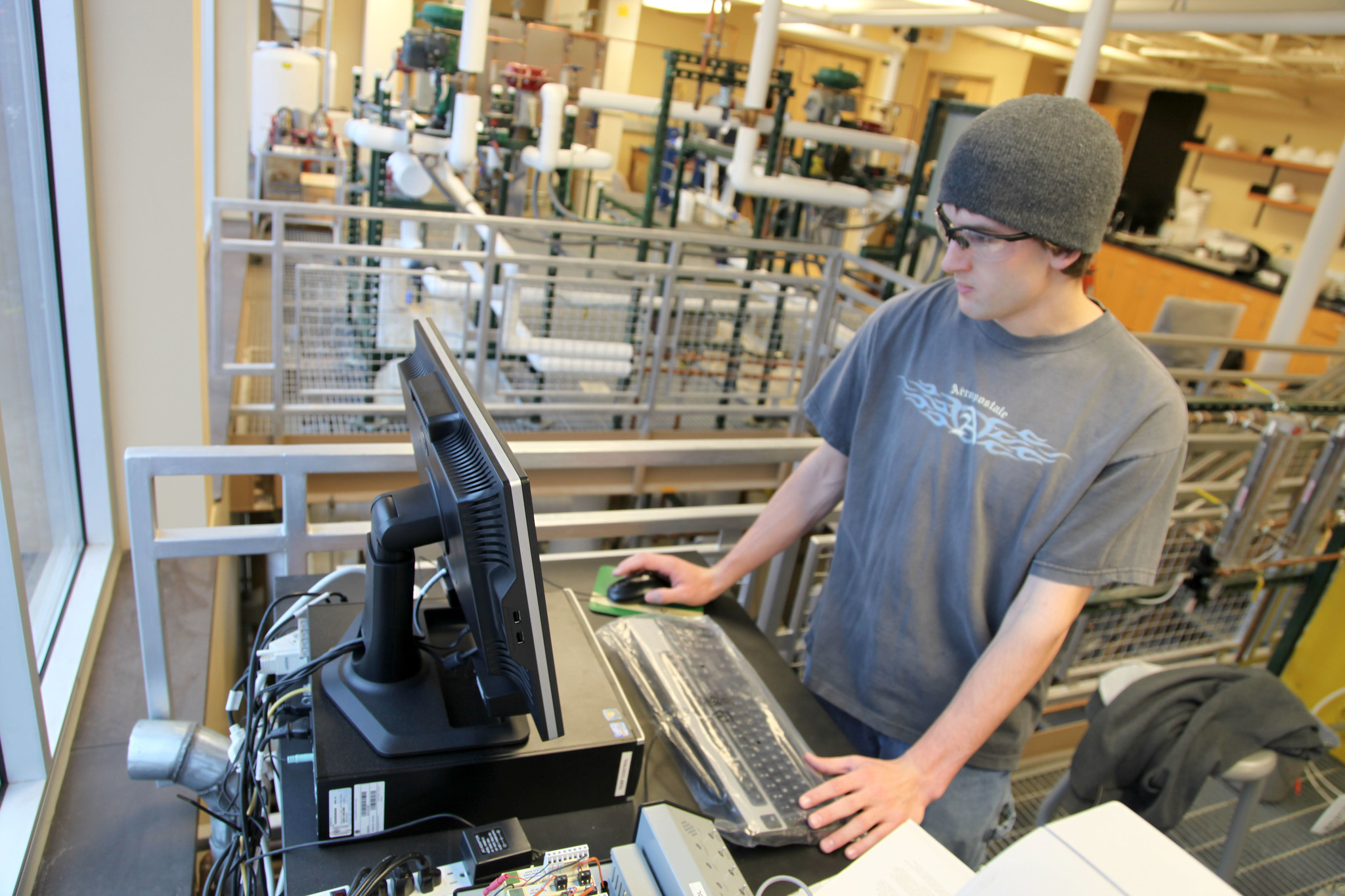
Bio- and Renewable Energy and Fuels
Our world is continually in need of energy and fuels to power our ever-growing population and infrastructure. Given supply concerns with conventional fossil fuels, the development of sustainable and renewable energy (bio-based, solar, etc.) is crucial. Department research in this area focuses on new applications of chemical reaction engineering, chemical engineering separations, novel solvents and solvent mixtures, and materials development.
Bang, Benjamin, Dixon, Gilcrease, Groven, Sani, Shende, Winter
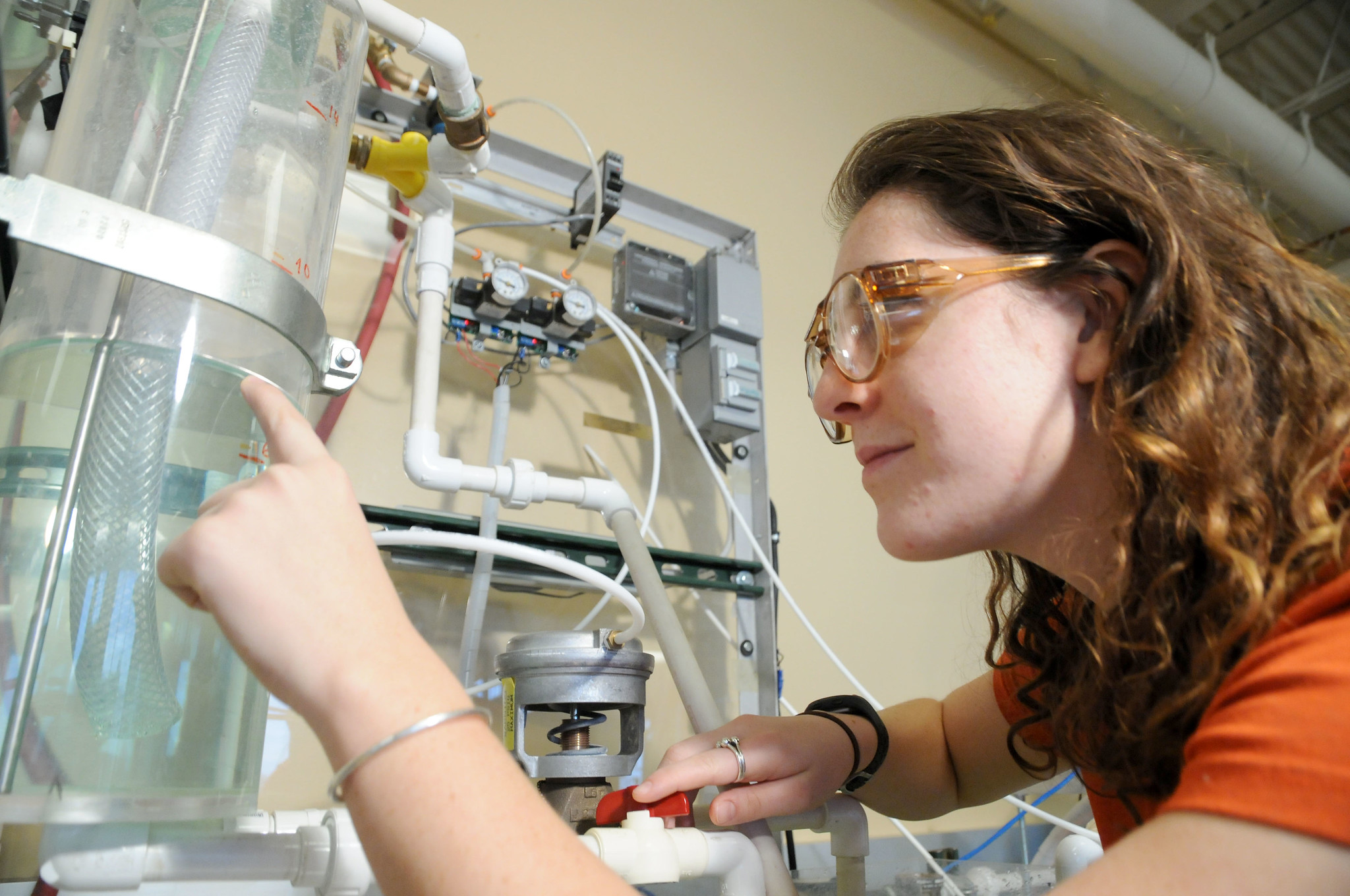
Biomaterials
The complete vision of a bio-processing plant involves the conversion of renewable biomass sources into not only energy and fuels, but value-added chemicals and products, too. Chief among these value-added products are materials, such as polymers, for ultimate use in mechanical and structural applications.
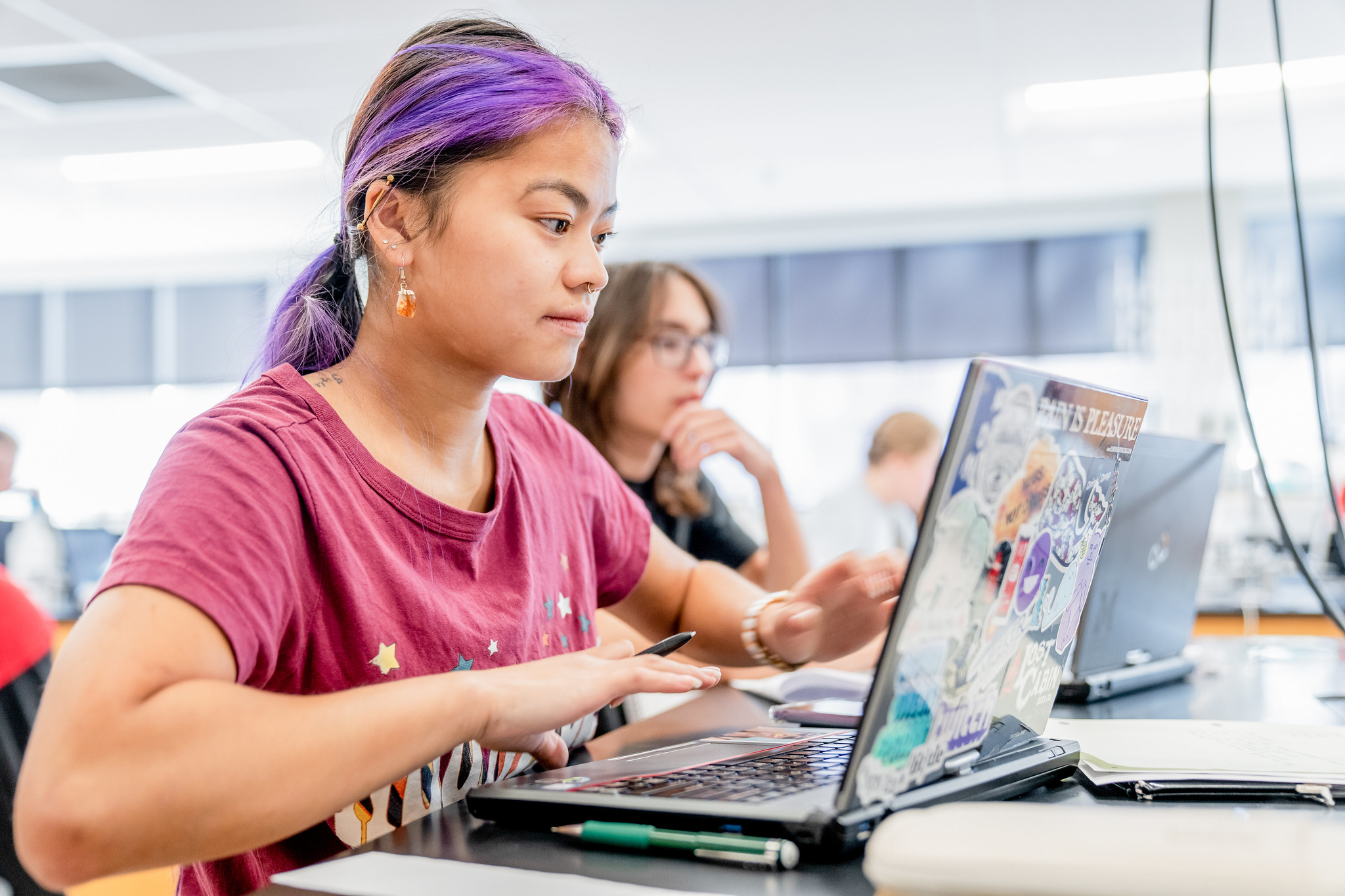
Catalysis and Reaction Engineering

Complex Fluids and Soft Solids
Engineers process a wide array of multiphase materials that include additions such as polymers, surfactants, colloids, and particulates.

Computer Simulation and Modeling
In addition to experimentation, computer simulation and modeling are crucial components in research. Activity in the department involves applications of finite element modeling of transport phenomena (coupled fluid/mass transfer, coupled heat transfer with chemical reaction) as well as molecular modeling and simulation investigations of materials (polymers, fluids), combustion, and catalysis.

Environmental and Remediation
The skills chemical engineers possess not only equip them to design new chemical and biological processes for commercial production, but also to design and engineer systems to aid the environment.
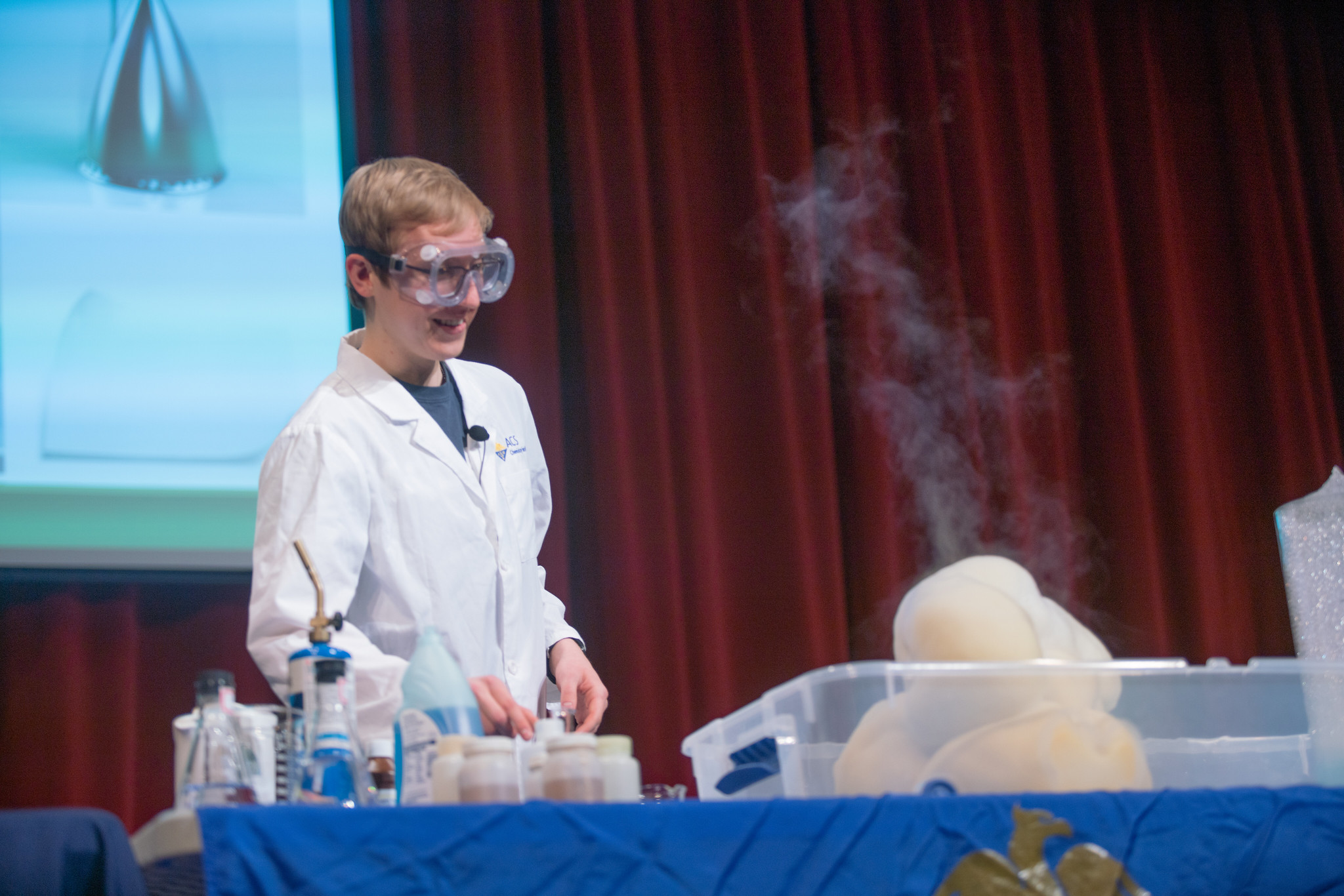
Molecular Biology and Biotechnology
Developing viable solutions for the improved production of bio-energy, bio-fuels, bio-chemicals, and bio–products requires research at the interface of molecular biology, microbiology, and chemical engineering.
Bang, Sani

Nanotechnology
Nano-scaled materials offer numerous application possibilities, and several advantages over their traditional macro-scale counterparts. Department research focuses on the use of nano-catalysts for water splitting and fuel chemistries, the synthesis of nano-energetic materials, and the synthesis and characterization of nano-composites for materials applications.
Groven, Salem, Shende, Walker, Winter
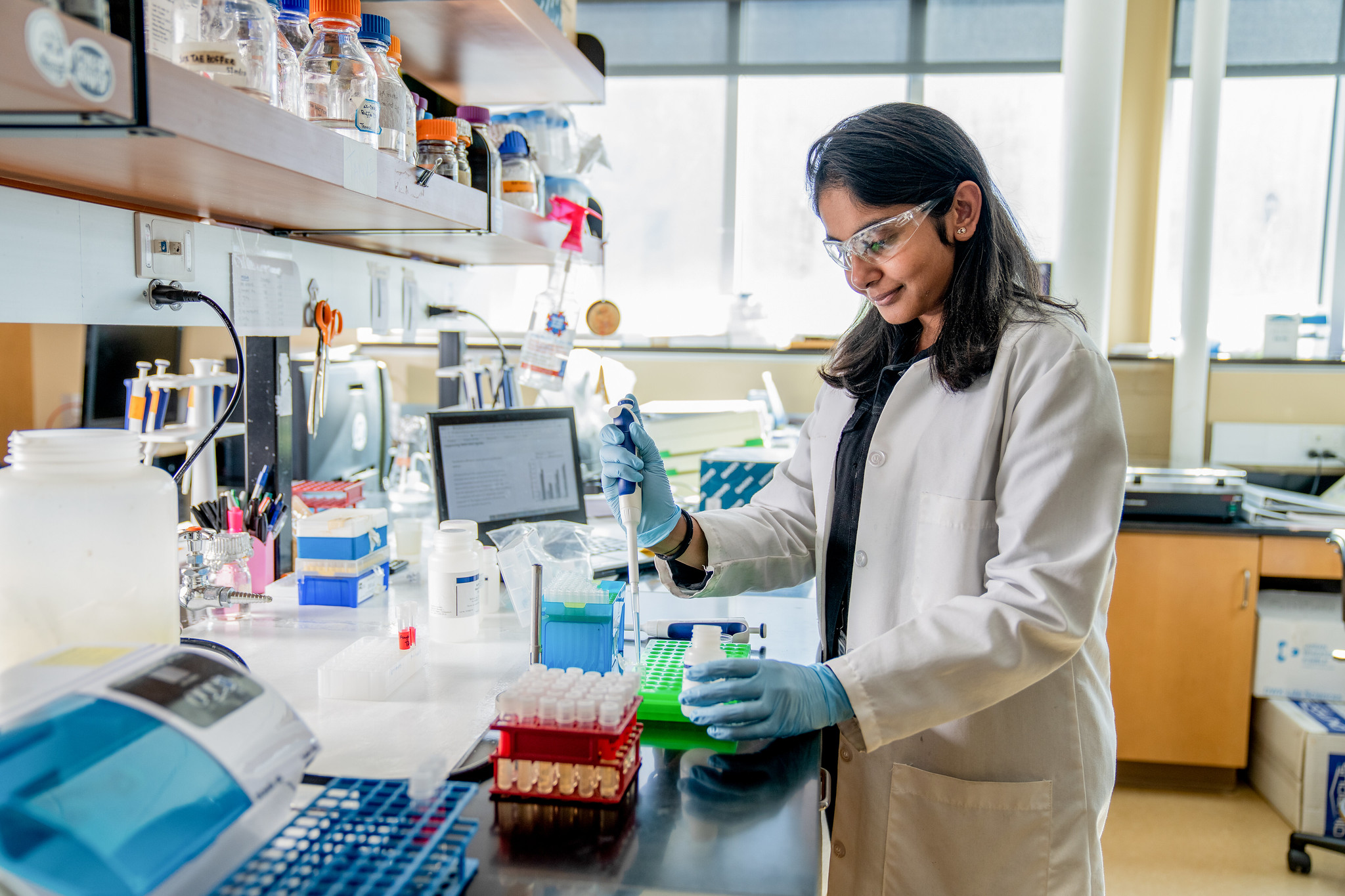
Polymers
Department research focuses on the development, characterization, and testing of polymers and polymer nanocomposites for these various systems and applications, and is facilitated by the Center for Advanced Polymer Engineering and the Composite and Nanocomposite Advanced Manufacturing Center.
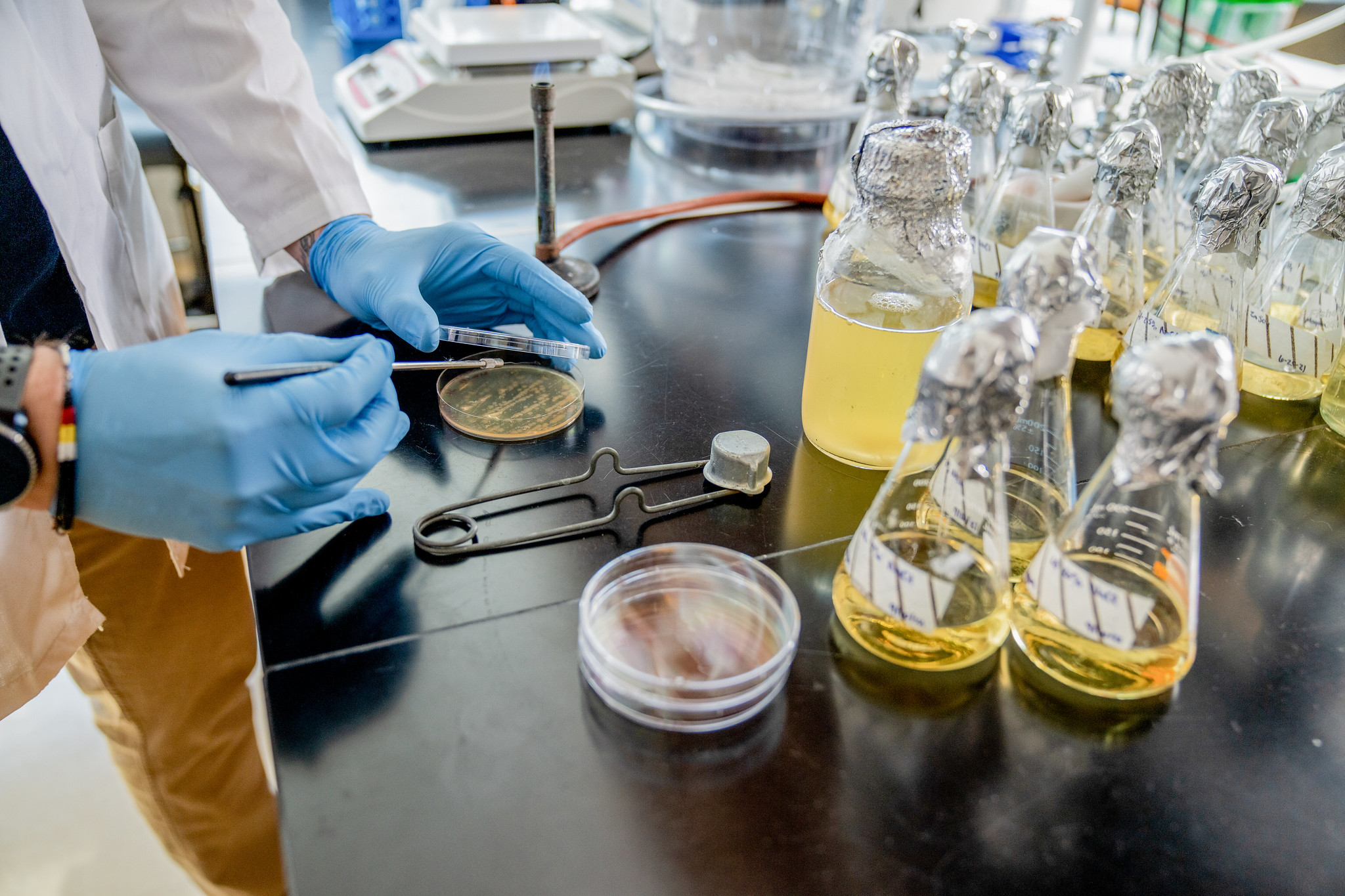
Separations
Chemical and physical separations are indispensable as part of a chemical engineering process. The ability to selectively remove/separate a desired product/molecule from one or more undesired products or constituent molecules is a crucial step in several industries, including biochemical, energy, environmental, and pharmaceutical technologies.



Have more questions?
Mailing Address
South Dakota School of Mines & Technology
501 East Saint Joseph Street
Rapid City, SD 57701
Toll-Free Telephone Number: (605) 394-2414
|
Rajesh Shende |
Alana Wells Senior Secretary Chemical and Biological Engineering Department (CBE) CBEC 2202 (605) 394-2421 Alana.Wells@sdsmt.edu |
